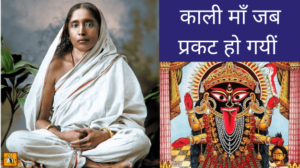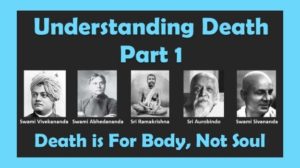Dear Readers,
This audio podcast constitutes the first of a new Hindi broadcast series that I am launching on a trial basis. For the next few months, I shall publish a new Hindi audio/video on the 15th of every month. English videos/posts shall continue to be published on the 1st of every month. Therefore if you like this Hindi series, or you have any other feedback or suggestions for me (especially if you are a non-Hindi speaker), then do leave them in the comments section below.
Through this Hindi series, I would like to acquaint you with the practical side of Advaita Vedanta. The philosophy of Advaita Vedanta has 2 aspects – the first is the theory, that is the principles of Advaita Vedanta which are found recorded in the Upanishads. And the second is the practical, that is the application of these Upanishadic principles in our day-to-day thoughts and actions, so that we can ascend towards the infinite consciousness of Samadhi and Moksha.
Just like the equations of Math or Physics, the principles of Vedanta are found noted in the Upanishads in the form of short, formulaic statements of fact. Because of the briefness and compactness of these statements it is very difficult for an ordinary person to properly comprehend them. A detailed explanation is therefore needed, but this explanation cannot come from the scholarly interpretations of religious priests, pundits or historians of ancient Indian culture (for example, researchers like Wendy Doniger).
The correct explanation can only be provided by a sage who has actually realized and experienced these Upanishadic truths “Pratyaksha“, that is first hand in the state of God-Realization or Samadhi. Religious pundits and research scholars lacking in this essential experiential perspective, often make the mistake of superimposing their own belief systems, prejudices, guesses and conjectures upon these spiritual truths.
Now by the beneficent grace of God several such divine sages have existed in India throughout her history, who having attained to Samadhi themselves, have experienced the spiritual truths recorded in the Upanishads first hand, and have taught them to the common people of their times. At the feet of such realized gurus, therefore we must necessarily sit if we want to understand Advaita Vedanta.
Out of several such God-realized sages, there are 5 key Rishis whose teachings I represent on the Spiritual Bee. They are Sri Ramakrishna, Swami Vivekananda, Sri Aurobindo, Swami Sivananda and Pandit Shriram Sharma Acharya. I chose these 5 sages, because I worship all 5 of them as my gurus, and being familiar with their writings, I find it easy to communicate the Vedantic principles enumerated by them in my videos and posts.
Now of these 5 sages, Pandit Shriram Sharma Acharya is my first and central guru as I received his Vedantic teachings right from my very childhood, on account of my mother being his ardent follower. Even so, while it may be natural for most to view these gurus as separate individuals, I however do not differentiate between them. What I mean by this is that I do not consider one guru to be better or greater than the other, because I see them all as embodiments of one and the same Supreme Power, which has worked up different bodies at different times to fulfill His mission of reawakening India and the world. These gurus therefore denote to me the 5 fingers of 1 hand of God.
Now each of these 5 gurus based on the needs of their times, choose to explain certain specific aspects of Advaita Vedanta in detail to their disciples. For example, Sri Ramakrishna, Swami Vivekananda, Sri Aurobindo and Swami Sivananda have focused on explaining the Upanishadic principles of Advaita Vedanta (its theory), whereas Pandit Shriram Sharma has concentrated on the second aspect of Advaita Vedanta, that is its practical side. For this reason, in order to present before you a complete picture of the vast and spread out philosophy of Advaita Vedanta, I combine the teachings of all 5 gurus in my articles and videos.
Hindi Podcast: Happy in Good Times, and Depressed in Bad – This Behaviour is Wrong!
In the enclosed Hindi podcast, we visit the practical Vedanta teachings of Pandit Shriram Sharma, who outlines the rational reason why our habit of desiring “an easy, happy life with no troubles or difficulties”, is extremely harmful from a spiritual perspective. Blinded by this distorted mode of thinking, we fail to adequately prepare our mind to deal with difficult times; and as a result, so long as life proceeds smoothly, so long as we get what we want, we remain happy and joyful; but the moment we hit a bump in the road, the moment we experience some difficulty, failure or sorrow, we are thrown into a downward spiral of depression and despair.
In such difficult times we either start to (1) wallow in self-pity, or (2) we start to blame God, fate, past Karma or other people for our problems, or (3) we become angry and frustrated, or (4) we look for an easy way out (such as towards astrologers) to rid us of our problems.
Weighed down by this type of defeatist, fatalistic and “get-rid-of-this-problem-quick” attitude we are unable to harness tough life situations to our advantage – we are unable to utilize them to develop the qualities of vivek (presence of mind, right judgement), bravery, courage, strong will, patience and perseverance within us. As a result of our defeatist response to life’s problems, we eventually end up weakening our mental makeup so much, that even when minor problems crop up, we immediately become overwhelmed, nervous and frightened, and give up, being unable to cope. Thus sinking into the Tamas of a lower consciousness we are unable to progress towards the infinite consciousness of Samadhi and Moksha.
Therefore the correct spiritual attitude, as Pandit Shriram Sharma has taught us in this podcast, is to accept the truth that life comprises both good times and bad; and knowing this truth we must prepare our mind to welcome difficulties, so that we can utilize them as opportunities to manifest the above listed qualities, all of which constitute the mind of a genuine Yogi.
Related Free Downloads
- Hindi Transcript of the above podcast.
- MP3 file of the above podcast.
- Yanmandalam or Surya Mandala Ashtakam (Gayatri Stavan), the background song used in the above podcast. Courtesy the All World Gayatri Pariwar (AWGP).
- Read the original Hindi article by Pandit Shriram Sharma, from which this podcast’s content is excerpted.








